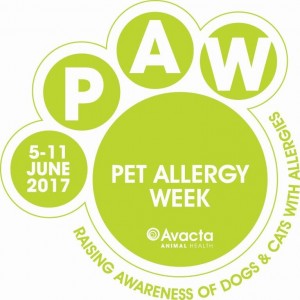
Just like us, animals can suffer from allergies. An allergy is a reaction of the immune system to a common substance, known as an allergen. The most common pet allergens are fleas, foods, tree pollens, grass pollens, moulds and mites e.g. house dust mites or food storage mites.
Allergens enter the pet’s body by being inhaled, ingested or absorbed through the skin.
Common symptoms of allergies in pets are manifested as skin disease and include:
- SKIN PROBLEMS – itching, scratching, rashes and redness. In dogs allergies commonly manifest as persistent licking, face rubbing, paw chewing and skin irritation/itching. In cats you may notice scabs on the skin or the cat persistently licking and grooming itself.
- EAR PROBLEMS – swelling, itching and soreness. If you dog suffers from repeat ear infections, there may be an underlying allergy.
- HAIR LOSS – commonly on the back/rump in dogs and cats with flea allergy.
These symptoms can be seen with a variety of other problems, but allergies are one of the most common. If your pet suffers with these signs, we would advise a check-up with the vet. They may advise tests including checks for fleas and other skin parasites; food trials; and blood tests to identify allergies. With the results of allergy blood tests, the vet can then provide you with options for managing your pet’s condition.
There is no quick fix to managing allergies in pets, but usually a combination of the following are used for skin disease:
- Strict flea control with effective prescription products
- Shampoos to prevent secondary skin infections and improve the skin barrier
- Special foods and/or supplements – either hypoallergenic if diet is a trigger factor, or diets/supplements formulated especially for skin disease which help to improve the skin barrier and reduce inflammation. Many pet foods are marketed as ‘hypoallergenic’, but for a true diet trial the vet may recommend a prescription hydrolysed diet, where the protein in the food is made too small to cause a reaction.
- Anti-inflammatory drugs
- Immunotherapy – these are injections used with the aim of de-sensitising the pet to their allergens
- Antibiotics/ear drops – these are sometimes needed to treat secondary skin/ear infections
Some pets may also have gastrointestinal problems e.g. diarrhoea, vomiting, loss of appetite and weight problems as a result of food allergies. Again further tests are required to confirm this and may include blood tests, stool samples, food trials, and in some cases imaging and/or biopsies
Throughout June we are supporting Pet Allergy Week with a number of special discounts:
- Reduced prices for specified allergy blood screens in conjunction with Avacta Animal Health. To book a check up with the vet to discuss allergy blood tests or to have your pet’s skin checked give us a call on 01803 606059 or book online. This offer is running throughout June.
- 25% discount on a special food, which has proven benefits in dogs with allergies (Hills Derm Defence). If your dog gets on well with the food we offer a loyalty scheme for further purchases in the form of a reward booklet. If your dog doesn’t like the food, you have nothing to lose as we offer a palatability money-back guarantee. This offer is running throughout June.
- 25% discount on Hills hypoallergenic dog and cat treats. These are made with hydrolysed protein so can even be fed to pets which are on a strict diet trial.
Complete Care Club members can also benefit from 5% (silver members) or 10% (gold members) off non-prescription shampoos and our Omega Oil skin supplement as part of their membership – the discount is automatically applied at the time of purchase.
For further information speak to a member of our team, drop us an e-mail at info@greenbayvets.co.uk or phone us on 01803 606059 (Torquay) or 843836 (Paignton).
